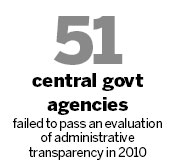Chinese gain right to sue govt for public records
Updated: 2011-08-16 07:49
By Zhao Yinan (China Daily)
|
|||||||||||
BEIJING - The highest court in China says citizens have the right to sue any government department that refuses to release information that the law makes open to the public.
According to a judicial interpretation that was enacted by the Supreme People's Court on Saturday, the Chinese people can file suit against government departments if they turn down or ignore requests to disclose non-classified information or to correct information that has already been published.
That change is seen by many as the government's latest attempt to make itself more transparent and to protect citizens' right to know about public matters.
|
 |
The judicial interpretation, which contains 13 articles, also says citizens, as well as corporations and other organizations, will be able to sue the government and ask for compensation if records that are released end up infringing upon their business secrets or privacy.
If a government agency declines to release information that has been asked for, it must explain its reasons for that decision.
In 2007, the State Council, China's Cabinet, adopted the Regulations on the Disclosure of Government Information, national regulations meant to ensure the public can obtain government records.
Not everyone, meanwhile, is optimistic the regulation will have its desired effect. Zhou Hanhua, a law professor at the Chinese Academy of Social Sciences, said it fails to say how governments will be held legally liable if they decline to provide information that has been requested. That makes it likely that plaintiffs will lose lawsuits they file over refusals to release public records.
"In fact, some government officials even believe that those who ask for this type of information are just being pests," he said.
In 2010, 51 out of 59 government departments under the State Council and 70 percent of 43 selected city governments failed to pass an evaluation of administrative transparency, according to an annual report released by the Chinese Academy of Social Sciences. More than 50 percent of the government departments being assessed scored between 30 and 50 on a scale on which 100 points was the highest possible score. The worst performer didn't even manage to get 10 points.
The executive editor of the report this year, Lu Yanbin, a law professor at the Chinese Academy of Social Sciences, said the judicial interpretation does more to encourage releases of public information than did the regulation. It, he explained, imposes legal requirements to ensure that public records come out quickly and in an accurate form.
A famous case in 2008 showed the limits of the regulation.
That year, a court in the Lianhu district of Xi'an, capital of Shaanxi province, refused an appeal from Hao Jinsong, a lawyer who filed a lawsuit after the provincial forestry authority had turned down his request for information related to an investigation into whether a photograph of a rare South China tiger was a fake.
The local court later wrote that Hao, instead of turning to the courts, should have appealed to higher officials in the forestry administration, as he was allowed to do under the State Council's regulation on government information disclosure.
Hot Topics
Anti-Gay, Giant Panda, Subway, High Speed Train, Coal Mine, High Temperature, Rainstorm, Sino-US, Oil Spill, Zhu Min
Editor's Picks

|

|

|

|

|

|







